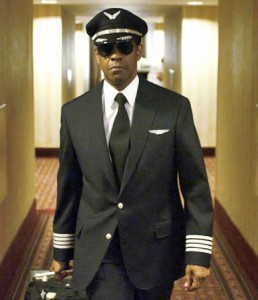Flight
Posted on November 1, 2012 at 5:59 pm
 Denzel Washington is at his best playing a man who is at his worst. “Whip” Whitaker is a brilliant airline pilot who flies commercial jets. He is also in deep denial about a substance abuse and addiction problem that is out of control. We see him waking up in a daze next to a naked girl, taking an angry phone call from his ex-wife, and medicating his hangover with some alcohol and cocaine.
Denzel Washington is at his best playing a man who is at his worst. “Whip” Whitaker is a brilliant airline pilot who flies commercial jets. He is also in deep denial about a substance abuse and addiction problem that is out of control. We see him waking up in a daze next to a naked girl, taking an angry phone call from his ex-wife, and medicating his hangover with some alcohol and cocaine.
And then he climbs into the cockpit and takes off into a heavy, gusting rainstorm. And then something goes very, very wrong. The plane takes a nosedive. No one has time to figure out what is wrong and almost no one would have enough time to figure out how to land the plane safely. But danger hits Whip like another snort of cocaine. He is suddenly fully present, awake, and in command. He issues quiet but commanding directions to the co-pilot and senior flight attendant and he comes up with a daring series of maneuvers from jettisoning the fuel to rotating the plane that allow him to land in an open field, with a minimum of injuries and fatalities.
Director Robert Zemeckis (“Forrest Gump,” “Back to the Future,” makes a welcome return to live action after a 12-year detour to work on motion capture animation (“Beowulf,” “A Christmas Carol,” “Mars Needs Moms”). He does a masterful job staging a thrilling but almost unbearably intense plane crash, which ends with a striking image as white-gowned Baptists from the church in the field race toward the plane to help rescue the passengers.
After the crash, two things become clear. Whip saved the lives of all but six of the people on the plane, something no other pilot could have done. And Whip was severely impaired at the time because he has an enormous substance abuse problem and an even bigger denial problem. A sympathetic union rep (the always-reliable Bruce Greenwood) and savvy lawyer (the always-excellent Don Cheadle) try to protect Whip — and, not incidentally, the union, the airline, and its insurer. They challenge the toxicology report which shows the levels of alcohol and drugs in Whip’s blood at the time of the accident, so that it cannot be reviewed as evidence by the NTSB. And they warn him that he had better straighten out before the hearing. But before he leaves the hospital, he is visited by his closest friend and drug dealer (a brilliantly funny John Goodman).
In the hospital, recovering from the injuries he suffered in the crash, Whip meets Nicole, a recovering drug abuser (Kelly Reilly of “Pride and Prejudice” and “Sherlock Holmes”). They have an eerie encounter in the stairwell with an outspoken cancer patient (a terrific James Badge Dale) who chills them with his gallows humor. After they get out, Whip invites Nicole to live with him, in part because he feels sorry for her and in part because he is no good at being alone. He must learn that it is his behavior that isolates him, no matter how much he tries to hide from it. And he senses that the same qualities that make him so good as a pilot may make him vulnerable to addiction.
The script wobbles and many people will find the ending unsatisfactory. It is not clear how we are supposed to feel about the religious themes that are raised by some of the characters and Whip’s ultimate choice may seem insufficiently supported. We know not to expect an easy answer about how his problems started or what he thinks of himself, but we are entitled to a clearer understanding of what matters to Whip than we get. Still, Washington may win a third Oscar for the depth, understanding, courage, and humanity of his performance. He is always mesmerizing on screen and the power of his charisma and the subtlety of his performances makes it easy to overlook just how specific he is as an actor. But he has always been a little reserved, a little held back. He is smart and dedicated enough to use that quality to good effect in creating his characters. But here he opens up more than he ever has, allowing us to be disturbed by Whip’s carelessness and irresponsibility and the way he hurts others but holding on to our attention and loyalty. Washington is the finest actor in Hollywood and it is genuinely thrilling to watch him.
Parents should know that this is a frank portrayal of substance abuse and addiction with drinking, drunkenness, drug use and drug dealing. Characters use very strong language and the movie includes explicit sexual references and non-explicit sexual situations and pornography. There is also an extremely graphic plane crash with characters injured and killed.
Family discussion: Which characters help Whip lie? Which ones don’t? Why? How do the qualities that make Whip a good pilot make him vulnerable to addiction? What will his answer be to the question he is asked at the end of the movie? Why do the people in this movie refer to the passengers and crew as “souls?”
If you like this, try: Substance abuse classics like “The Days of Wine and Roses” and “The Lost Weekend”
